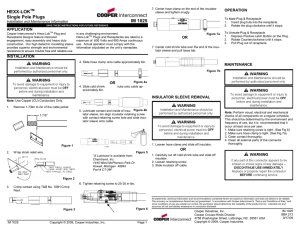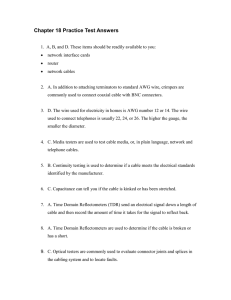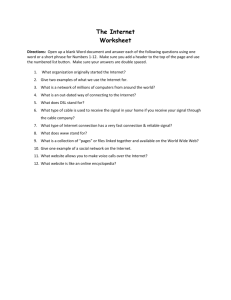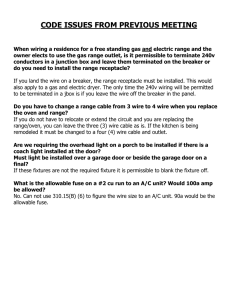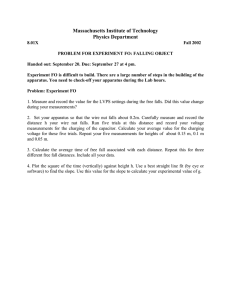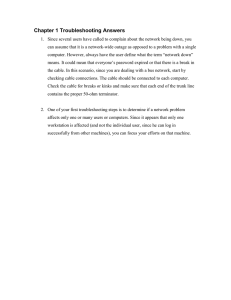ARKTITE 150 Amp Plugs - Model M4 IF 1564
advertisement
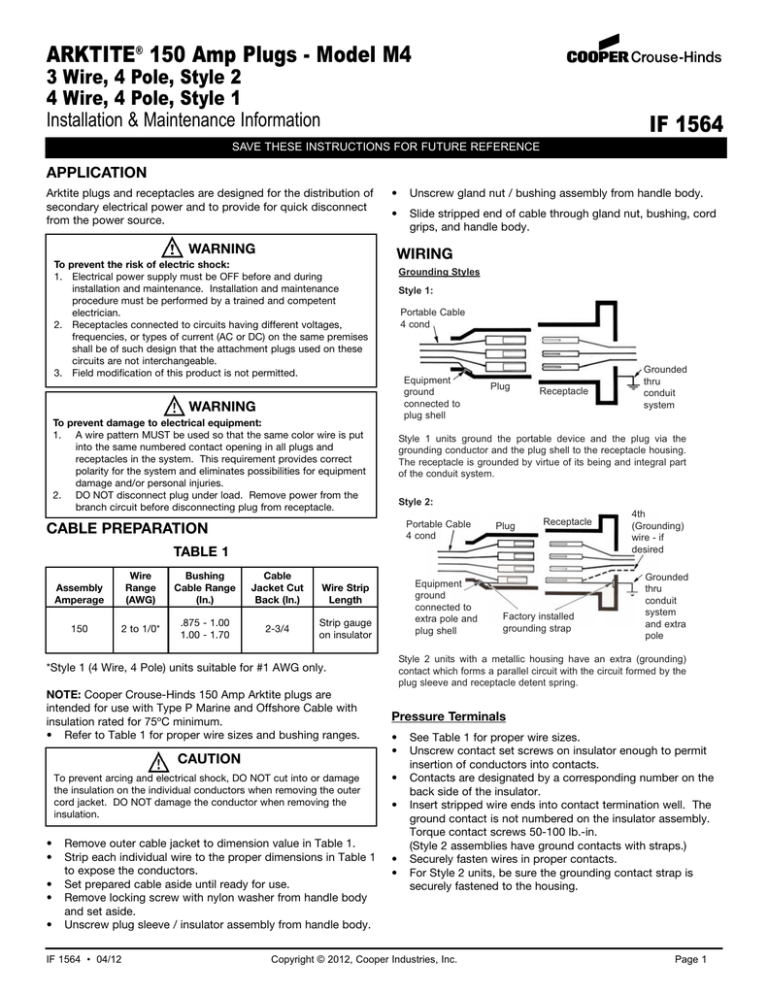
ARKTITE® 150 Amp Plugs - Model M4 3 Wire, 4 Pole, Style 2 4 Wire, 4 Pole, Style 1 Installation & Maintenance Information IF 1564 SAVE THESE INSTRUCTIONS FOR FUTURE REFERENCE APPLICATION Arktite plugs and receptacles are designed for the distribution of secondary electrical power and to provide for quick disconnect from the power source. WARNING To prevent the risk of electric shock: 1. Electrical power supply must be OFF before and during installation and maintenance. Installation and maintenance procedure must be performed by a trained and competent electrician. 2. Receptacles connected to circuits having different voltages, frequencies, or types of current (AC or DC) on the same premises shall be of such design that the attachment plugs used on these circuits are not interchangeable. 3. Field modification of this product is not permitted. • Unscrew gland nut / bushing assembly from handle body. • Slide stripped end of cable through gland nut, bushing, cord grips, and handle body. WIRING Grounding Styles Style 1: Portable Cable 4 cond Equipment ground connected to plug shell WARNING To prevent damage to electrical equipment: 1. A wire pattern MUST be used so that the same color wire is put into the same numbered contact opening in all plugs and receptacles in the system. This requirement provides correct polarity for the system and eliminates possibilities for equipment damage and/or personal injuries. 2. DO NOT disconnect plug under load. Remove power from the branch circuit before disconnecting plug from receptacle. Plug Receptacle Style 1 units ground the portable device and the plug via the grounding conductor and the plug shell to the receptacle housing. The receptacle is grounded by virtue of its being and integral part of the conduit system. Style 2: Portable Cable 4 cond CABLE PREPARATION Plug Receptacle TABLE 1 Assembly Amperage Wire Range (AWG) Bushing Cable Range (In.) Cable Jacket Cut Back (In.) 150 2 to 1/0* .875 - 1.00 1.00 - 1.70 2-3/4 Equipment ground connected to extra pole and plug shell Wire Strip Length Strip gauge on insulator CAUTION To prevent arcing and electrical shock, DO NOT cut into or damage the insulation on the individual conductors when removing the outer cord jacket. DO NOT damage the conductor when removing the insulation. • • • • • Remove outer cable jacket to dimension value in Table 1. Strip each individual wire to the proper dimensions in Table 1 to expose the conductors. Set prepared cable aside until ready for use. Remove locking screw with nylon washer from handle body and set aside. Unscrew plug sleeve / insulator assembly from handle body. IF 1564 • 04/12 Factory installed grounding strap 4th (Grounding) wire - if desired Grounded thru conduit system and extra pole Style 2 units with a metallic housing have an extra (grounding) contact which forms a parallel circuit with the circuit formed by the plug sleeve and receptacle detent spring. *Style 1 (4 Wire, 4 Pole) units suitable for #1 AWG only. NOTE: Cooper Crouse-Hinds 150 Amp Arktite plugs are intended for use with Type P Marine and Offshore Cable with insulation rated for 75ºC minimum. • Refer to Table 1 for proper wire sizes and bushing ranges. Grounded thru conduit system Pressure Terminals • • • • • • See Table 1 for proper wire sizes. Unscrew contact set screws on insulator enough to permit insertion of conductors into contacts. Contacts are designated by a corresponding number on the back side of the insulator. Insert stripped wire ends into contact termination well. The ground contact is not numbered on the insulator assembly. Torque contact screws 50-100 lb.-in. (Style 2 assemblies have ground contacts with straps.) Securely fasten wires in proper contacts. For Style 2 units, be sure the grounding contact strap is securely fastened to the housing. Copyright © 2012, Cooper Industries, Inc. Page 1 • RE-ASSEMBLE PLUG ASSEMBLY Bushing Assembly Gland Nut Cable Grip & Screws Hand tighten gland nut onto handle body until snug. Wrench tighten to 300 lb.-in. (7 1⁄8 turns). Wrenching surfaces are provided on the handle body and gland nut. Plug Sleeve Clamp Nut Clamp Nut Handle Body • Locking Screw Wrenching Surfaces Insulator Assembly Seat insulator assembly in plug sleeve. Thread plug sleeve / insulator assembly into handle body. Insulating liner in handle body will align with plug sleeve posts while threads engage. Thread handle body onto sleeve / insulator assembly completely. Back handle body off to align threaded hole on post of sleeve with locking screw hole on the handle body. • Insert and tighten locking screw with nylon washer to secure sleeve / insulator assembly to handle body. • Unscrew gland nut to expose cord-grip assembly. (Gland nut ratchet may snap several times while loosening). • Tighten the three screws evenly on the cable grip assembly to clamp handle body assembly to cable. Torque each screw to 30 lb.-in. • Torque ring, bushing, and slip washer are automatically positioned for installation as gland nut is rethreaded onto the handle body assembly. WARNING To prevent damage to electrical system: 1. Before energizing this system, verify polarity correctness with a continuity check. Correct polarity MUST be ascertained before using the equipment. 2. Check insulation resistance to be sure system does not have any short circuits or unwanted grounds. MAINTENANCE Electrical and mechanical inspection of all components must be performed on a regularly scheduled basis, determined by the environment and frequency of use. It is recommended that inspection be performed a minimum of once a year. WARNING To prevent the risk of electric shock or injury to personnel: 1. If any parts of the plug or receptacle appear to be missing, broken, or show signs of damage, DISCONTINUE USE IMMEDIATELY. Replace with the proper replacement part(s) before continuing service. NOTE: Bushing must be securely nested in the recess of the slip washer and the torque ring. The torque ring is designed to lock the gland nut into position and prevent loosening of the gland nut. Bushing assembly must be installed with ramp side of torque ring resting on the cable grip for locking action to function. If locking feature is not desired, use extra slip washer (optional) in place of torque ring and discard torque ring. See picture below. WARNING To prevent the risk of electric shock: 1. Electrical power must be OFF before and during installation and maintenance. Installation and maintenance procedure must be performed by a trained and competent electrician. • Slip Washer Bushing Ramp Cable Grip and Handle Body Side Gland Nut Side Torque Ring NOTICE Without torque ring, gland nut may loosen over time and seal between bushing and cable jacket may be diminished. The Sure- • • • • Inspect all contact wire terminals for tightness. Discoloration due to excessive heat is an indicator of a possible problem and should be thoroughly investigated and repaired as necessary. Clean exterior surfaces, making sure nameplates remain legible. Check tightness of all screws before using. Inspect housing and replace those which are broken. Check contacts for signs of excessive burning or arcing and replace if necessary. In addition to these required maintenance procedures, we recommend an Electrical Preventative Maintenance Program as described in the National Fire Protection Association Bulletin NFPA No. 70B. CE Marking – All CE marked Arktite Plugs, Connectors and Receptacles are intended to be mated only with other CC-H CE marked Arktite catalog items. WARNING ™ Seal cable bushing assembly requires the use of the torque ring for best long-term environmental seal. To avoid electrical shock or electrocution, plugs (with exposed contacts) must not be used as the power source, as the user may come in contact with energized contacts or other components while attaching locks or hasps in the lockout/tagout hole provision. All statements, technical information and recommendations contained herein are based on information and tests we believe to be reliable. The accuracy or completeness thereof are not guaranteed. In accordance with Crouse-Hinds "Terms and Conditions of Sale," and since conditions of use are outside our control, the purchaser should determine the suitability of the product for the intended use and assumes all risk and liability whatsoever in connection therewith. Cooper Industries Inc. Crouse-Hinds Division PO Box 4999, Syracuse, New York 13221 • U.S.A. Copyright © 2012, Cooper Industries, Inc. IF 1564 Revision 4 Revised 04/12 Supercedes 10/11
